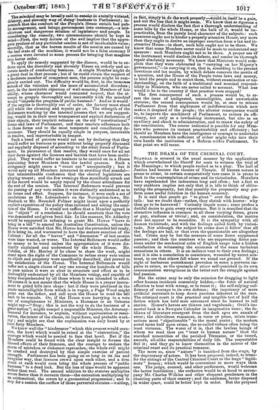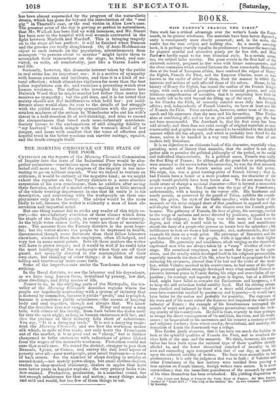THE DRAMA OF THE CRIMINAL COURT.
SCANDAL is aroused in the usual manner by the applications which overwhelmed the Sheriff for seats to witness the trial of the Mannings ; to which people rushed as to a play. The hall of Justice had become the theatre of Thespis. If human nature is prone to crime, in certain comparatively rare cases it is prone to flock to the contemplation of crime and its vicissitudes. Moralists have reprehended the indecorum long and often ; but a fact so very stubborn implies not only that it is idle to think of oblite- rating the propensity, but that possibly the propensity may per- form some useful function in the human economy. It is said that people go "to gloat" over the shocking de- tails : but we doubt that—rather, they shrink with horror : why then go to be harrowed ? Curiosity impels some ; some profess a dutiful desire to gain every experience. But it is manifest that the attractive influence is common to all these varying forms, grave or gay, studious or trivial ; and, on consideration, the motive does not appear to be recondite. It is the sympathy with all human vicissitude, and with the feelings called forth by vicissi- tude. Nor although the subject be crime does it follow that all the feelings are bad, or that even the questionable are altogether bad. Crime may be but the measure of some fierce suppressed passion ; and then the numbers who are suppressing fierce pas- sions under the mechanical calm of English usage take a hidden satisfaction in witnessing the existence of the same turbulent sensations in others. It is an indirect vent to their own feelings; and it is also a consolation to conscience, wounded by secret mis- trust, to see that others fall where we stand our ground. If the sight of barbarous punishment provokes in some a perverse im- pulse to crime, so the spectacle of crime self-punished in its own consummation strengthens in the better sort the struggle against bad passion.
But the crime may be only the occasion for dragging to light other human incidents commonly hidden,—the force of natural affection to bear with wrong, or to resist it ; the self-relying suf- ficiency of courage to its own defence; the impotency of mere artificial restraints to keep down passions inherent in the race. The criminal court is the practical and tangible test of half the fiction which has held man entranced since he learned to tell stories. Homer's heroes are thieves and vagabonds ; Ovid's im- mortal book is a Newgate Calendar in imaginative verse ; the fa- bliaux of literature resurgent from the dark ages are annals of error; the chivalrous romances, in verse or prose, relate trans- actions most " objectionable " to the moral purist ; the modern novel turns half upon crime, the so-called virtues often being the least virtuous. The worst of it is, that the lawless beings of whom we read thus are "truer to human nature" than the starched nonentities of the perished Tremaine, or the tamed, smooth, all-alike respectabilities of daily life. The respectables feel it; and they go to know themselves in the mirror of the criminal court and its practical romance. The more so, since "nature" is banished from the stage, by
the degeneracy of actors. It has been proposed, indeed, to trans- fer the sittings of the Central Criminal Court to the huge "leiii- mate" houses; which would be convenient in more ways than one. The judge, counsel, and other performers, would welcome the better ventilation ; the orchestra would be at hand to accom- pany Mr. Charles Wilkins and other eloquent gentlemen in the chanting parts of their oratory ; and the audience, better disposed in wider space, could be better kept in order. But the proposal
has been almost superseded by the progress of the naturalistic drama, which has gone far beyond the introduction of the "real gig" in Thurtell's case, or the real victim in Alice Low's case. The greatest actor of the day is getting so perfect in naturalness, that Mr. Wallack has been laid up with lameness, and Mr. Stuart has been sent to the hospital with real wounds contracted in the fight between Macbeth and Macduff. This is bringing tragedy on to the stage all but perfect: it will be finished when Duncan and the grooms are really slaughtered. Or, if Anti-Malthusians object to such inroads on the population, advertisements from managers "to persons about to murder" might invite them to accomplish their transactions on the stage, be tried, and con- victed, en suite, all comfortably, just like a Gazza Ladra of real life.
Seriously, however, this dramatic interest taken by the public in real crime has its important use : it is a motive of sympathy with human passions and incidents, and thus it is a kind of na- tural affection ; which stimulates vigilance far more than the best police regulations can do, and exercises a protecting watch over human weakness. The ruffian who inveigled his mistress into Dulwich Wood that he might murder her rather than marry her receives no sympathy ; but the girl does, and it is far better that society should not feel indifferent to what befel her : yet indif- ference alone would close its ears to the details of her struggle with the pitiful rascal. Society sympathizes with the poverty- stricken madness of the artisan. in Manchester who cut his wife's throat in a half-drunken fit of evil-thinking, and tries to amend the circumstances that breed such semi-voluntary murderers. Society listens to the exclamations of still clinging fidelity to "my husband" which mingle with the woman's detail of her danger, and hears with comfort that the voice of affection and hopeful trust in the better passions can survive outrage, squalor, and the death-struggle itself.



























 Previous page
Previous page